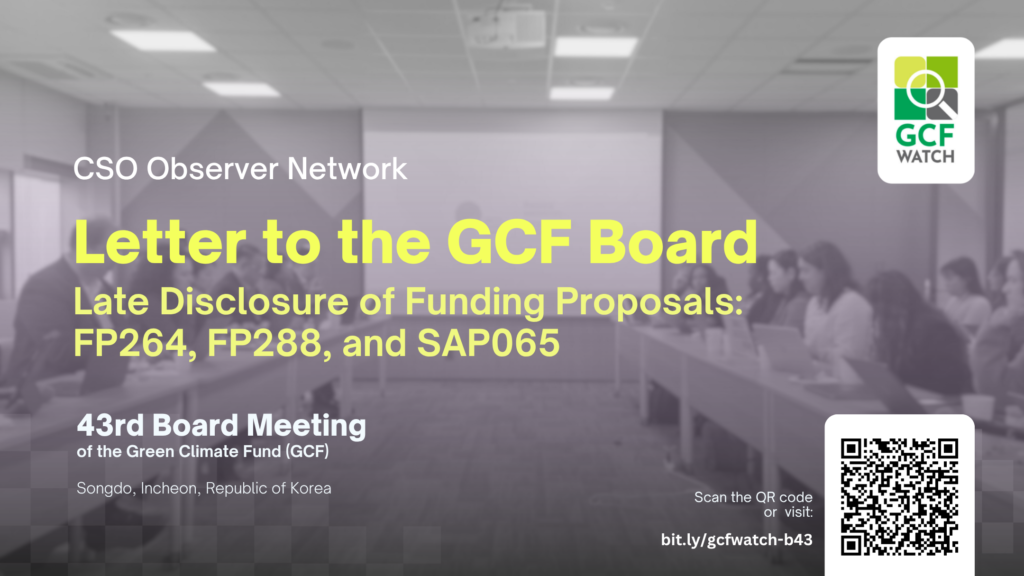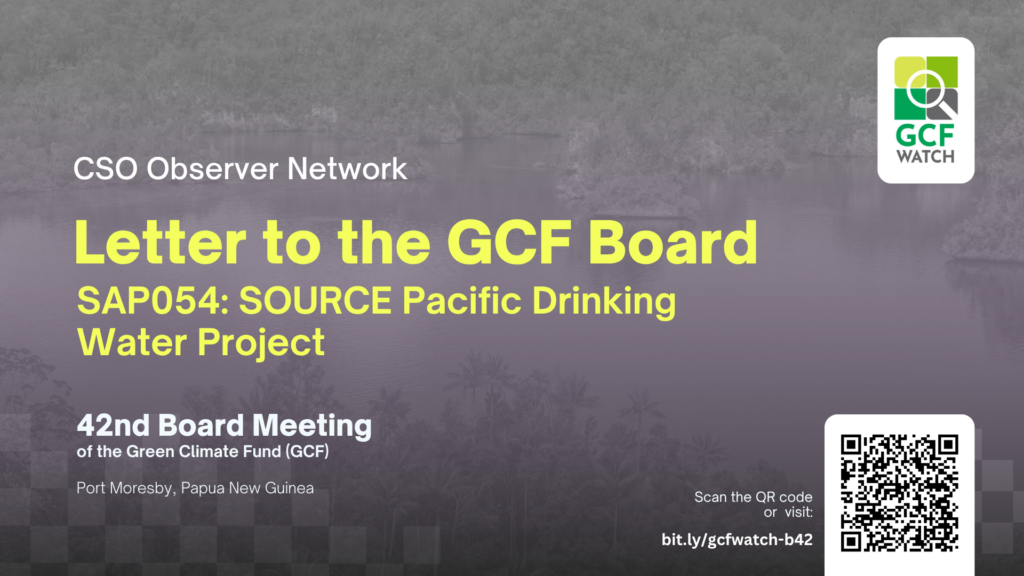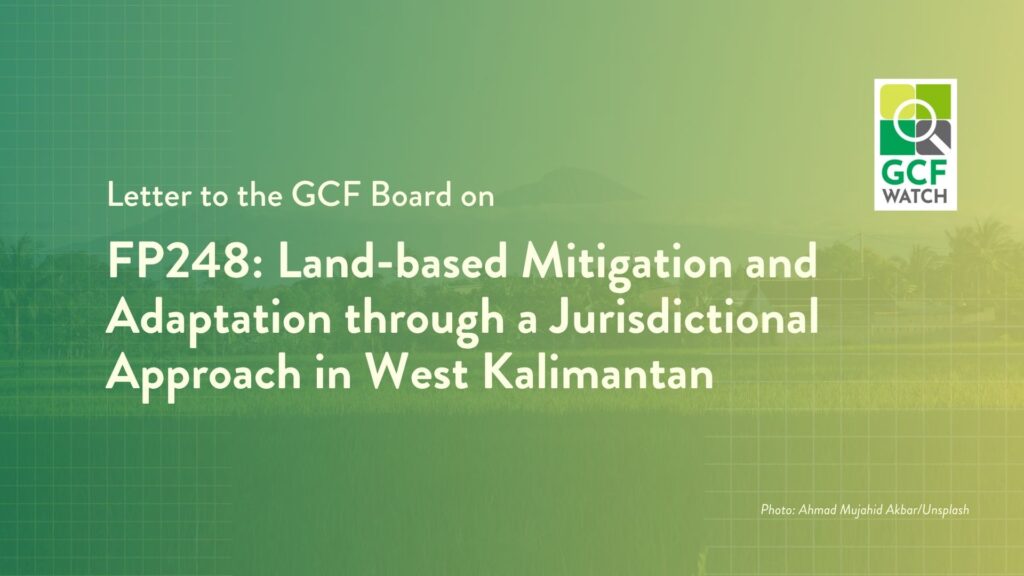
The fourth day of the GCF B27 started with the discussion on the Review of the Multilateral Organization Performance Assessment Network (MOPAN). MOPAN is a network of like-minded donor countries that aim to monitor the performance of multilateral development organisations, such as the GCF. In December 2019, MOPAN communicated with the GCF Secretariat its interest to conduct an assessment, however, no specific information about the scope, methodology or timing of the assessment was provided. At B26, this agenda item was tabled for Board consideration, but due to lack of time, it was not thoroughly discussed and deferred to B27.
At this Board Meeting, the GCF’s Executive Director presented what MOPAN is about and confirmed that details on methodology, scope and others will be shared to the Board soon. He added that the proposed approach of the assessment is aligned with the Fund’s Governing Instrument and it will be beneficial to the Fund in order to improve its transparency to stakeholders and the efficiency and effectivity of its day-to-day operations.
The divide between developed and developing country BMs became apparent on this matter. Developing country BMs asserted the Board was not properly informed and that upon receipt of the communication from MOPAN, the Executive Director went ahead and initiated internal processes, including allocation of resources to actively participate in the review without any Board approval. BM from Egypt clarified that they have nothing against the organization and the substance of the review, and that they are just raising a procedural issue that only one Board committee knew about the review. BM from Saudi Arabia said further that it is the COP that can commission a review and not the Board, and the Board can only decide to hire an external auditor to assess the Fund.
On the other hand, developed country BMs, many of them aware of MOPAN, said they do not see any problem with the review. Many of them said that as contributors to Fund resources, the MOPAN review is necessary especially with the policy gaps that remain unresolved by the Board. BM from the US, in response to the point made by Saudi Arabia, he said the Board should get involved with the MOPAN assessment, and that the assessment laid out in the COP is not exclusive and will not be in conflict with MOPAN. BM from Sweden manifested that the procedural issue raised is a clear reflection of how the organization is dealing with the issues mentioned in the reports published by the Independent Evaluation Unit (IEU), particularly on the delayed action on leadership. He added that as a BM of a contributor country, he expects to have the Fund assessed regularly so as to gauge its performance and direction.
That statement by Sweden triggered BM from Egypt and Saudi Arabia to respond and emphasize that requirements like having a MOPAN review, and other third-party assessments, should never serve as conditions for contributions. The basis of resource mobilization should always be about common but differentiated responsibility (CBDR) as well stipulated in the Paris Agreement. And in response to the move made by the Executive Director without Board approval, BM from Saudi Arabia urged Yannick Glemarec to drop any evaluation process that commenced and recommended to ask the COP to commission an external auditor for the GCF instead.
The back-and-forths ended when the co-chair reminded them that the document is an information doc, and that it only requests the Board to take note. He also asked the GCF Executive Director to take note of the comments made and advised not to make any decisions regarding the matter without consulting the Board.
The discussion was followed by the Secretariat’s presentation of the Updated and Upgraded Integrated Results Management Framework (IRMF). The IRMF is used by the GCF, both of its Board and its Secretariat to screen, review, and evaluate the performance of proposed and implemented projects. The current results management framework (RMF) used by the GCF was developed way back in 2014 and its latest review was held in 2018 by the Independent Evaluation Unit (IEU). In B22, the Board agreed that the RMF should be updated, take into account the recommendations of the IEU, and integrate all other documents such as the strategic plan of the Fund, the Initial Results Management Framework, Performance Measurement Framework, REDD+ Results Based Payments, and other measurement documents.
In an attempt to integrate the existing GCF policies to the IRMF, the Secretariat noted the following changes:
- Single and unified results management framework for all projects (Single IRMF)
- Better alignment of the IRMF with the Investment Framework of the GCF
- Reduction of overall number of indicators
- Clearer determination of contribution of projects to paradigm shift and systemic change
- Clearer roles and responsibilities of stakeholders partaking in the funding proposals or projects
- A new comprehensive handbook on complying with the IRMF for entities who wish to access the GCF
- And minor changes to guidance on monitoring and evaluation, arrangements, and reporting systems of AEs
The Secretariat also emphasized that with the new IRMF, there will be a streamlining of the process. It aims to bring little new reporting burdens and work with the Results Tracking Tool (RTT), which was envisioned to become the one-stop-shop for all of the results gathered by and for the Fund, as well as work with the Strategic Plan of the Fund.
Many of the Board Members from developed countries, specifically the Board Members of Denmark, Norway, Sweden, Germany, Spain, France, and the United States (US), agree version of the IRMF presented is acceptable and is ready for adoption. However, the BM from the UK raised questions about the consultations done and the status of the written comments submitted by other Board Members and by Accredited Entities. He also asked why the Board is not deciding on this item at this meeting (document presented was an information document), especially as the IRMF is part of the work plan of the Board.
Developing country BMs raised concerns regarding the consultation process conducted by the Secretariat. The BM from South Africa, along with the BMs from The Bahamas, Ecuador, and Iran raised that the IRMF is very complicated and that several AEs coming from their constituencies believe the new framework will increase their operating and compliance costs. The BM from the Bahamas added that such complications will put smaller AEs, especially DAEs, at a more disadvantaged position.
Our CSO intervention, delivered by Julius MBatia (Alternate Active Observer from developing country CSOs) echoed the points made by developing country BMs and emphasized that the current form of the IRMF, given its complicated nature, disenfranchises indigenous peoples and CSOs which were already given less attention during the consultation processes leading up to the current version of the proposed IRMF draft.
In response to the question by BM from the UK, the BM from US asked the secretariat to incorporate and rectify the issues raised by developing country BMs, as well as prepare a decision text regarding the IRMF that the Board can adopt at this meeting. The Secretariat agreed and expressed their willingness to work with the BMs. They also assured the Board that the IRMF was developed not to complicate the processes nor burden AEs, but instead help them with the issues around compliance using the proposed streamlining mechanisms. The Secretariat also confirmed that translation to UN languages (Arabic, Chinese, English, French, Spanish, and Russian) will be made available.
BM from Saudi Arabia, in concurrence to the other manifestations of the BMs from developing countries, objected to the proposal and reminded the Board that the act of suddenly turning an information document into a decision document is unprecedented based on the rules of procedure (RoP). BM from South Africa echoed this and added that developed country BMs have been fervent in expressing their support for the adoption and implementation of the IRMF, so as to ask the Secretariat if there is a decision document drafted and ready for adoption. Given the need for further discussion, not only among BMs but also with the Secretariat, BM from Iran proposed to take the IRMF decision to B28 instead of forcing a decision at this meeting.
To respond to the concern raised by BM from Saudi Arabia, the co-chair confirmed that an information document may become a decision document under the rules of procedure, then she proceeded to close the item after asking the Secretariat to note the comments raised.
The Board then proceeded to discuss the Secretariat Work Programme and Annual Administrative Budget of the GCF Secretariat, Board, and Trustee. Although already adopted during the informal session last 2 November 2020, the Secretariat shared that the Work Programme for 2021 was developed under three important considerations: the goal of achieving the USD $10 Billion replenishment target, the number of new projects coming into the Fund, and persistence of Covid-19 that will prompt the Secretariat to transition into a virtual set-up in carrying out its duties. They added that there may be adjustments to the work programme when the updated strategic plan (USP) is passed by the Board.
The Secretariat presented 6 priority areas of their work programme which are:
- Origination of country-driven, paradigm-shifting investments;
- Project development and appraisal to build an impactful GCF portfolio;
- Management of portfolio implementation for results and knowledge;
- Supporting the Board and consolidation of GCF policy and governance framework;
- Facilitating access and accelerating implementation by improving process efficiency, effectiveness, transparency, and speed of delivery; and
- Fostering a high performance collaborative culture and consolidating institutional capacities and oversight.
In support of these priority areas, the GCF presented the highlights of their work programme for 2021:
- Enhanced support for project origination and development in order to help developing countries to turn their investment plans to robust projects
- Reaching an annual programming of $1.8-2.2 Billion USD which is consistent in the goal of fully disbursing resources raised in GCF-1 by 2023
- The Direct Access Programming Goal, Strategy, and Coordinator, as approved by the Board, in order to enhance Direct Access Entity (DAE) engagement
- Adaptive Management of Expanding Portfolio and Knowledge in response to the COVID-19 pandemic and knowledge generation for better GCF operations results
- Improved Delivery, and Investment in Staff Safety and Culture
A total of USD 83.5 million is requested to be the administrative budget. The said amount was reviewed by the Board Budget and Audit Committee and have been broken down by body as indicated in the table below:
Table 1: Draft Administrative Budget of the GCF Board, Secretariat, and Trustee (in millions, USD)
| Approved 2020 | Draft 2021 | Change | Change (in percentage) | |
| Board | 4.0 | 4.8 | 0.7 | 18.5% |
| Secretariat | 71.6 | 75.0 | 3.4 | 4.8% |
| Trustee | 2.9 | 3.8 | 0.9 | 30.4% |
| Grand Total | 78.5 | 83.5 | 5.0 | 6.4% |
The increase in the Board’s budget is due to the 4 newly hired consultant-members for the Independent Technical Assessment Panel (ITAP) and 1 new staff for the ITAP. The increase in the budget of the Secretariat is mainly due to the COVID-19 contingencies, adaptation and continuous aim to fully staff the GCF with 250 personnel. The increase in the Trustee budget on the other hand, is due to the IT systems customization, the direct costs of the increased volume of services needed, the indirect costs such as the recovery policy implemented, and increase in the cash balance of the fund thus resulting to more costs incurred in managing the investments of the Fund.
BM from Egypt raised concerns about the lack of financial management plan in the proposed budget. He recalled how the budget during the Initial Resource Mobilization period had to be slightly comprised when the GCF spent approximately USD 1 billion to foreign exchange losses. He believed the said loss could be avoided if a sound financial plan and management is implemented, and then he suggested to include in the decision text a request to ask the Secretariat in coming up with a comprehensive financial plan for GCF-1 resources vis-a-vis the commitment authorities.
Comments from the developed country BMs were focused on the need to address policy gaps (the USP, IRMF, Accreditations Framework for the ITAP, Private Sector Engagement Strategy, etc.) and called on other BMs to cooperate and make no further delays in the adoption of the said policies. BM from Sweden in support of addressing policy gaps, suggested adding in the decision text a provision that mandates the Secretariat to develop an accreditation strategy, without providing any more information about the specifics and scope of the strategy.
Developing country BMs were united in rejecting the proposal from Sweden and emphasized that before developing a strategy, the Accreditation Committee should first develop the Accreditation Framework. To counter, developed country BMs asserted that the financial management plan proposal should not be accepted as well. But BM from Egypt asserted and explained that a financial management plan is necessary to ensure the limited resources of the Fund are spent well.
In the midst of the volley of questions and concerns raised by developing country BMs, BM from Saudi Arabia asked the Executive Director about “Green Recovery” and why it has been added to the Secretariat work plan. He asserted that adding such item without clear explanation about its context, meaning, or scope, should never be used as a condition for countries to access the readiness support for programming efforts on COVID-19 recovery measures.
The discussion on this item ended after the BM from Sweden withdrew his proposal and only the request to develop a financial management plan was added to the decision text.
Similarly, the Board discussed the Work Programme and Budget of the Independent Evaluation Unit (IEU), an item that was also adopted during the November 2 informal meetings. A representative from the IEU presented a number of assessments that are currently being undertaken, together with the target dates of publication:
- Rapid assessment of GCF Request for Proposal Programme (to be released in B29)
- GCF Private Sector Approach
- Effectiveness of GCF investments in LDCs (to be released in B31/year 2022)
- Learning oriented real time impact assessment (LORTA) (3 baseline reports in year 2021)
- Second Performance Review (subject to budget approval, to be released in year 2023)
Given all these reports, together with a number of capacity building and advisory services that the IEU will provide, the unit requested for a total budget of USD 5.21 million for FY2021, which is a 5.9% increase from the previous budget. They also requested the Board Budget Committee to review the budget execution of IEU in year 2021, and to allow the unit under its guidance to submit additional budget requests if needed, as well as prepare a multi-year budget for the Second Performance Review of the Fund, which is for Board consideration at B28.
Overall, the Board overall supportive of the workplan and budget. There were additional manifestations like BM from France who requested the IEU to ensure alignment of the private sector evaluation with the private sector strategy. BM from Liberia also added that the IEU should also look into thematic assessments, such as an adaptation approach, in its future evaluations.
BM from Egypt raised to the Board his concern about the number of evaluations done every year (5 per year or 20 in every programming period). He proposed to reduce the number to 2-3 per year and added that the reviews should ultimately focus on quality rather than quantity. BM from Sweden responded by saying the issue lies not on the number of reviews conducted, but on the lack of space during Board Meetings to discuss evaluations.
Although the decision to approve the IEU budget was adopted by the Board, the agenda item was not closed as the Board has yet to receive the textual edits submitted by BM from Egypt reflecting his views about the Budget Committee providing options for staffing size of the independent units. The co-chair decided to suspend the item and move on to the next agenda item, the Work Programme and Budget of the Independent Integrity Unit.
Ibrahim Pat, the head of IIU, presented an overview of the achievements made by the unit for this year, including the streamlined investigation processes and protocols implemented, which was recognized by the IEU as an improvement in terms of efficiency and productivity. He also reported how 86% of the cases submitted to the IIU have been closed this year, and how they are seeing lower cases every year. Because of Covid-19 restrictions, the unit’s budget expenditure in 2020 was at 76% only, with majority spent in procurement of the case management software. As for the 2021 budget, the IIU requested a total of USD 2.79 million and asked the Budget Committee and Ethics and Audit Committee to review the budget execution next year.
Since there were no comments from the Board, the request was adopted.
Due to limited time, agenda 16 (a) Initital analysis of options to minimize effects of currency fluctuations on the GCF commitment authority was not opened in Day 4. The co-chair promised the Board to settle all remaining agenda items, including those that were suspended for further deliberation, the following day, which is the last day of B27.
You can catch the proceedings of the GCF B27 at https://www.greenclimate.fund/boardroom/meeting/b27#videos from 9PM – 1:00AM KST.
*Full text of CSO Interventions for B27 can be accessed here.








